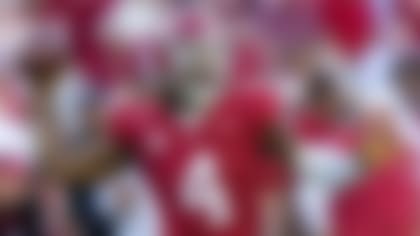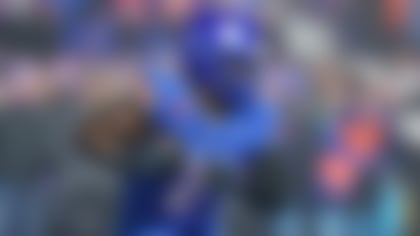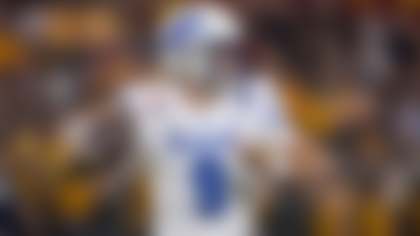Three menacing Dallas Cowboys defenders chased the young quarterback toward the right sideline, long arms outstretched and closing with a vengeance. At the last second, a retreating Joe Montana sailed a third-down pass that, to the naked eye, seemed to be intended for a guy in the third row of seats behind the north end zone at Candlestick Park.
Watching at home in West Los Angeles with my father, the one person who could understand the angst and torment ripping through my 16-year-old stomach at this moment of truth, I felt only relief: One more play ... the dream survives ... Trailing by six with 58 seconds to go in the 1981 NFC Championship Game, the San Francisco 49ers -- the team I realistically loved more than anyone or anything outside of my immediate family -- had lived to fight another down.
And then came a sensation I can still recall with vivid clarity three-and-a-half decades later: sweet, ebullient shock ... a red blur that had no business being there flashing into the frame, and when focus finally returned, Dwight Clark landing in the back of the end zone with the football in his hands, and all of San Francisco shaking with the euphoric force of a man-made earthquake.
So, too, was the cozy den where my dad and I watched the most important game of my childhood, on a day when my life as a habitually heartbroken fan of Bay Area sports teams living in enemy territory would change forever. For not only was "The Catch" one of the most significant plays in NFL history -- one that would all but end the Cowboys' long run of excellence in the Tom Landry era and propel the Niners to one of the greatest stretches of sustained success the sport has known -- but it was also the moment I stopped believing that all sporting events to which I tied my identity were destined to cause me pain.
On that surreal Sunday, after Eric Wright proceeded to drag Drew Pearson down by the shoulder pads, Lawrence Pillers forced the blissful fumble that Jim Stuckey recovered and the Niners closed out their 28-27 victory, it truly felt like a miracle had occurred: Finally, after so many heartbreaking postseason defeats to the Cowboys -- most brutally the 1972 game at Candlestick that the 49ers had led by 12 at the two-minute warning -- my guys had prevailed. At long last, after years of being taunted by friends partial to the Lakers and other L.A. teams (including one who, as fate would have it, would grow up to coach my beloved Warriors), I could stroll through the quad with pride.
The morning after The Catch, I shamelessly squeezed into the musty 49ers jersey that had come in one of those youth-uniform kits I'd gotten as a pre-teen birthday present and walked down the driveway like a boss. My friend Brozzi -- whose uncle, Butch Johnson, was a standout Cowboys receiver, and who thus had flown to San Francisco to attend the game -- zoomed up in his faded red Volkswagen Rabbit to pick me up, as per usual on school days. When he saw my attire, he was so disgusted that he kept right on going, finally stopping halfway up the block and thus making me skip through the street to reach the car.
I wasn't one of those kids who especially enjoyed high school, but that was a very, very good day.
The memory is bittersweet: Brozzi died in Norway two years ago, on the day before I turned 50, not too long after his second child was born. And this past March, as if someone my age needed yet another reminder of life's fragility, the man who made The Catch announced that he is suffering from ALS.
Partly because of his starring role in that formative moment of my childhood, and partly because of the friendship and guidance he has extended to me in the years since, Dwight Clark is very much on my mind as I prepare to cover the 29th NFL season of my very blessed career. I spent the first five of those seasons as a newspaper beat writer assigned to the Niners, and Clark -- who'd retired the year before I'd gotten my first gig, with the now defunct Sacramento Union -- was always around.
Looking back, there were a lot of people who had no use for a loud, clumsy, impudent journalistic neophyte trying to find his way in one of the sports world's most loaded and conspicuous settings. Thankfully, Clark was not one of these people.
At first, Clark seemed mostly to be hovering around as a cherished part of 49ers owner Eddie DeBartolo's always-lively entourage; he would eventually ascend through the organization's front-office structure, ultimately becoming San Francisco's general manager and later serving in the same capacity for the newly reconstituted Cleveland Browns.
When I first got to know Clark, I had every reason to be intimidated by him. Upon getting assigned the Niners beat, I had stopped rooting for them or any other NFL team, but obviously, he was a childhood hero, and far from a one-hit wonder: The 6-foot-4 receiver was a two-time Pro Bowl player whose emergence as one of the NFL's better receivers paralleled the landscape-changing rise of coach Bill Walsh's West Coast offense. And Clark, a former 10th-round draft choice (yes, there were 12 rounds back then), carried an aura of awesomeness into his post-football existence: Handsome, charming and perpetually cheerful, the man lit up a room without acting as though he owned it.
Clark didn't have to be nice to me, but he unfailingly was, and that meant a lot. Back in 1989, my rookie year on the beat, there were 15 newspaper writers (including two each for the Bay Area's three largest papers) who covered the defending-champion Niners on a daily basis. That list included the San Francisco Chronicle's Ira Miller, the most fearsome beat writer in the country, and beasts like the San Francisco Examiner's Frank Cooney and the San Jose Mercury News' Jeff Schultz. I used to wake up early in the morning feeling semi-nauseous, dreading that walk to the front door of my apartment to pick up my copy of the Chronicle, which would give me the first indication of how badly I'd been roughed up by the competition.
Eventually, I got better, and the fear got smaller, and the Niners stayed great and relevant, which was not inconsequential. That '89 team repeated as Super Bowl champions, giving the Niners their fourth title of that decade, and San Francisco would go on to win a fifth crown in January of 1995, two months after I'd improbably jumped from the Santa Rosa Press Democrat to Sports Illustrated.
I did not consider these developments to be coincidental. Because I'd covered a glamorous team that played in big games, my stories got more attention than they otherwise would have, and there were always national media people around to read those stories -- all of which was quite significant in an era before the worldwide web opened up the channels of dissemination. A whole lot of people associated with that Niners dynasty went on to become successful in various posts across the NFL universe, and over the years, I've had no shame in admitting to anyone who'd listen that I rode Montana's coattails, just like everybody else.
The truth is, however, that Montana was not alone. There have been many, many people who've helped me grow as a journalist and take advantage of the opportunities I've been given, and it's not a stretch to say that I might not be enjoying this highly satisfying professional existence without having been uplifted by folks like Clark.
He taught me a lot, probably without realizing it. Some of it was tangible: There were times Clark would patiently explain things to me that allowed me to report with greater insight, without him receiving any discernible benefit in return. He also helped me learn that a reporter and a source were fully capable of having fruitful conversations without reenacting a Woodward/Deep Throat parking lot scene from "All The President's Men." When Clark had something to say, even if it was polarizing or unpopular, he said it on the record, and he didn't try to walk back the words after the fact.
I'll spare you the rest of the Inside Journalism intrigue, except to note that Clark continued to provide insight into the glory days long after his front-office career ended, and especially in Candlestick's waning days.
More importantly, Clark taught me that a man could live out a remarkable dream, emerge as a beloved icon for one of America's most storied cities, receive the spoils that come with such a regal role -- and never, ever act as though he were owed a morsel of it.
Unlike so many people who get caught up in their own success, Clark always exuded a comprehension that nothing is promised. Merely getting a shot to play in the NFL had been a stroke of good fortune. Bill Walsh had come to Clemson to scout quarterback Steve Fuller, who enlisted his former Tigers teammate to catch passes during the workout -- ultimately allowing Clark to catch the eye of the greatest offensive strategist of his generation, perhaps ever.
Things snowballed from there, but not without right place/right time overtones. Clark wasn't supposed to be 5 yards open on some routes, but Walsh's scheme helped make it so; he wasn't supposed to catch 82 passes in his second season and 85 in his third; and in the '81 NFC title game, he wasn't supposed to leap over Cowboys cornerback Everson Walls and make a fingertip catch that led to the first professional sports championship the city of San Francisco had ever experienced.
Surely, Clark worked hard for his achievements, both as a player and as an executive, and he was armed with the requisite confidence. Yet, that never morphed into attitude or entitlement or dismissiveness, even in times of tension. That meant a lot when I was grinding my way through growing pains during the early years on the beat -- and it still means a lot, even as I self-assuredly cackle on television sets across the land.
The NFL universe is intense and chaotic and fleeting and relentlessly charged. Tipped balls or dubious calls can change a season, and proud, hard-working, accomplished people can earn promotions or be told to clean out their office based on those outcomes. We all have pride and opinions and swag and trigger points and families to feed, and tempers flare and relationships fray along the way.
And sometimes, in rare cases, it's just easy. That's how it's always been with Clark -- until now.
As Clark confronts the brutality of ALS and summons a strength no human should ever have to, there are many, many people he has touched along the way who feel helpless and horrified and walloped by that harsh reality. None of us can do anything to change that, but I guess I wanted him -- and you -- to know that I really, really wish I could.
When Clark made his diagnosis public in March, he issued a statement that addressed the potential source: "I've been asked if playing football caused this. I don't know for sure. But I certainly suspect it did. And I encourage the NFLPA and the NFL to continue working together in their efforts to make the game of football safer, especially as it relates to head trauma."
I'm glad he included those words, but they didn't surprise me. As always, Clark was up front, honest and doing his very best to stay pragmatic amid the drama. And as we embark upon another season wrought with intensity and intrigue, I hope everyone in the NFL community takes those words to heart.
Covering this league has been a joyride, and these past 28 seasons have been a blur. I'll go into my 29th with this on my mind: Before I was a journalist, I was a tormented teenage fan sitting with my father in a cozy den, hoping for a miracle. Now I'll pray that the man who made The Catch can somehow experience another one.
Follow Michael Silver on Twitter @MikeSilver.












